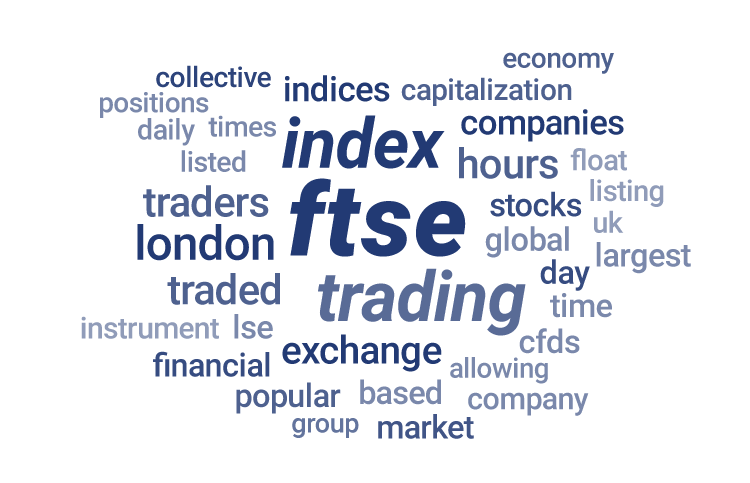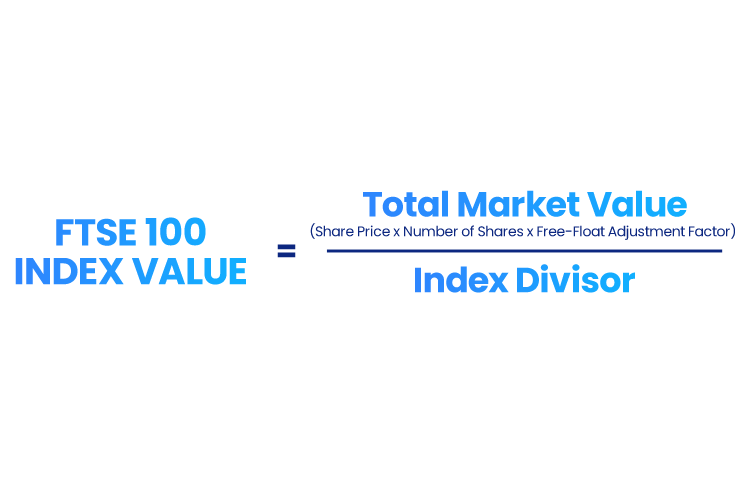What is the FTSE 100 Index?
The FTSE 100 (pronounced “footsie”) is an index that follows the London Stock Exchange’s largest 100 companies by market capitalization. Other popular names for the FTSE100 include the FTSE 100 index, the Financial Times Stock Exchange 100 Index, or simply “The FTSE”.
The History of the FTSE100
In 1984, the Financial Times Stock Exchange set out to develop an index that was similar to other indices from different countries. This specific index would focus on the performance of companies listed on the London Stock Exchange (LSE), allowing traders to view a snapshot of the LSE at any given time.
Traders quickly recognized the potential for trading the FTSE100 (UK100) as an instrument, similar to how a share or commodity is traded. This made the index a household name alongside the S&P 500 (USA500), the Dow Jones Industrial Average- DJIA (USA30-Wall Street), and other popularly traded indices.
In addition, the FTSE 100 which became a widely used gauge for UK stocks’ performance, also led to the creation of other indices such as the FTSE 250.

How Is the FTSE 100 Calculated?
The FTSE100 uses a Float-Adjusted Market Capitalization system. The Financial Times and the London Stock Exchange worked together to compile the top 100 companies on the LSE, based on the size of a company’s total market capitalization. Only float (openly traded) shares were used to determine the valuation.
This means that a company’s size is not based on just share availability or trade volume, but according to the collective value of all their publicly traded shares.
Each company is then given a specific ‘weight’ in the index. Values are recalculated at the end of each trading day so the index can be updated.

How to Trade the FTSE 100?
While the FTSE100 can not be traded as an instrument itself, traders can use various other means to open positions on this popular index.
One popular way of doing this is by trading CFDs,which are based on FTSE100 futures contracts, allowing for positions to be opened and executed during regular trading hours.
Profit can be recognized by opening a ‘Buy’ position (going long) or a ‘Sell’ position (going short) that moves in the trader’s favour. These positions also expose traders to risk and potential losses.
You can learn more about what CFDs are and how to trade CFDs in our video on “What Is CFD Trading.”
Who Manages the FTSE100?
The London Stock Exchange Group (LSEG) owns the FTSE group which manages the FTSE100, FTSE250, and other FTSE indices.
They are responsible for calculating and updating the daily valuation of the indices. They also meet every quarter to review the status of FTSE 100 companies and discuss the eligibility of growing companies that may be added to the listing.
What Are the FTSE100 Trading Hours?
Since the FTSE100 lists the 100 largest companies on the London Stock Exchange, its value fluctuates throughout the trading day. As listed above, Plus500 CFDs allow you to trade on fluctuations throughout the day, but official numbers are published by the London Stock Exchange Group (LSEG) after each day’s closing.
The London Stock Exchange is open daily from 8:00AM - 4:30PM London time, excluding weekends and holidays.
When trading FTSE 100 (UK100) CFDs on the Plus500 platform, the instrument is active for 20 hours on trading days from 1:00 AM to 9:00 PM London time. This allows traders to speculate on pre-trading and after-hours trading values.
The FTSE100 has become a benchmark index that global traders rely on. Following, this, key index gives an insight into the British economy and global markets as a whole. Together with the S&P 500 (USA500), traders can speculate on the UK, US, and global economy as a whole.
Biggest FTSE 100 Companies
As the name implies, the FTSE 100 index tracks 100 companies traded on the London Stock Exchange. Here are some of the biggest FTSE 100 companies by market capitalization as of July 1, 2023:
AstraZeneca plc (AZN.ST)
AstraZeneca was founded in 1999 and is a Cambridge-based pharmaceutical and biotechnology company that works within the oncology, cardiovascular, and neuroscience fields among other fields.
HSBC Holdings plc (HSBA-L)
HSBC is a London-based banking and financial services company that was established in 1865. The company offers financial services, stocks, and Forex, among other services.
Unilever plc (ULVR-L)
Unilevel was established in 1929 and is a London headquartered consumer packaged goods company that offers various services ranging from food to beverages and cleaning products to beauty products.
Glencore (GLEN-L)
Glencore is a Swiss multinational mining and commodity company that has a headquarters in London. At one point, this company was deemed the largest commodity company in the world.
FTSE 100 FAQs
What does FTSE stand for?
The FTSE, Footsie, or FTSE 100 stands for Financial Times Stock Exchange.
What is FTSE?
The FTSE is a stock market index that tracks the biggest 100 publicly traded companies listed on the London Stock Exchange.
What is a FTSE 100 company?
A company whose shares are traded on the London Stock Exchange and whose performance is tracked by the FTSE 100 index. As of November 2023, some of the FTSE 100 companies are Rolls Royce Holdings (RR-L), Marks & Spencer (MKS-L), and Centrica (CNA-L).
Is the FTSE 100 a good investment?
The FTSE 100 can be a good investment depending on your goals and if you are interested in gaining exposure to the LSE’s top companies without tracking each share individually.
How do you invest in the FTSE 100?
You can invest in FTSE ETFs or trade CFDs on indices. Alternatively, you can choose to trade or invest in individual FTSE 100 stocks instead. This can be done through buying shares or trading Share CFDs.
What is the highest the FTSE has been?
The highest the FTSE has been is 7,877.45 points, reached on May 22, 2018.
When does the FTSE open?
The FTSE typically opens at 8:00 AM UK time.
What time does the FTSE close?
The FTSE closes at 4:30 PM UK time on normal trading days.
